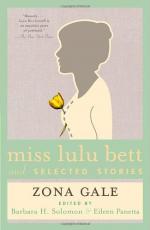“Yes!” shouted the child Monona.
The tension relaxed. Mrs. Deacon assented. Lulu went to the kitchen. Mr. Deacon served on. Something of this scene was enacted every day. For Monona the drama never lost its zest. It never occurred to the others to let her sit without eating, once, as a cure-all. The Deacons were devoted parents and the child Monona was delicate. She had a white, grave face, white hair, white eyebrows, white lashes. She was sullen, anaemic. They let her wear rings. She “toed in.” The poor child was the late birth of a late marriage and the principal joy which she had provided them thus far was the pleased reflection that they had produced her at all.
“Where’s your mother, Ina?” Mr. Deacon inquired. “Isn’t she coming to her supper?”
“Tantrim,” said Mrs. Deacon, softly.
“Oh, ho,” said he, and said no more.
The temper of Mrs. Bett, who also lived with them, had days of high vibration when she absented herself from the table as a kind of self-indulgence, and no one could persuade her to food. “Tantrims,” they called these occasions.
“Baked potatoes,” said Mr. Deacon. “That’s good—that’s good. The baked potato contains more nourishment than potatoes prepared in any other way. The nourishment is next to the skin. Roasting retains it.”
“That’s what I always think,” said his wife pleasantly.
For fifteen years they had agreed about this.
They ate, in the indecent silence of first savouring food. A delicate crunching of crust, an odour of baked-potato shells, the slip and touch of the silver.
“Num, num, nummy-num!” sang the child Monona loudly, and was hushed by both parents in simultaneous exclamation which rivalled this lyric outburst. They were alone at table. Di, daughter of a wife early lost to Mr. Deacon, was not there. Di was hardly ever there. She was at that age. That age, in Warbleton.
A clock struck the half hour.
“It’s curious,” Mr. Deacon observed, “how that clock loses. It must be fully quarter to.” He consulted his watch. “It is quarter to!” he exclaimed with satisfaction. “I’m pretty good at guessing time.”
“I’ve noticed that!” cried his Ina.
“Last night, it was only twenty-three to, when the half hour struck,” he reminded her.
“Twenty-one, I thought.” She was tentative, regarded him with arched eyebrows, mastication suspended.
This point was never to be settled. The colloquy was interrupted by the child Monona, whining for her toast. And the doorbell rang.
“Dear me!” said Mr. Deacon. “What can anybody be thinking of to call just at meal-time?”
He trod the hall, flung open the street door. Mrs. Deacon listened. Lulu, coming in with the toast, was warned to silence by an uplifted finger. She deposited the toast, tiptoed to her chair. A withered baked potato and cold creamed salmon were on her plate. The child Monona ate with shocking appreciation. Nothing could be made of the voices in the hall. But Mrs. Bett’s door was heard softly to unlatch. She, too, was listening.




